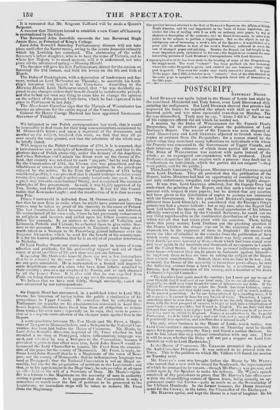We intimated to our Polish correspondents last week, that it
would be impossible to find room for their long communications occasioned by Ostrowski's letter ; and upon a reperusal of the documents, and another on the subject, received this week, we find that they all go over nearly the same ground, and that the substance of the whole may be briefly stated.
With respect to the Polish Constitution of 1791, it is is asserted, that it introduced no new principles of hereditary monarchy, and that in the glorious days of Polish prosperity, under the dynasty of the Jagellons, and when Boleslaus end Casimir the Great were on the throne of Po- land, that country was ruled not by mere " puppets," but by real Kings. By the Constitution of 1791, the liberum rein was proscribed, and the inhabitants of towns were admitted to participation in the privileges enjoyed by the. nobles. So far from the Constitution of 1791 being considered perfect, was provided that it should undergo revision every twenty-five years; though it unfortunately lasted only one year. It was a great step towards constitutional liberty, and recognized the soundest principles of free government. As such, it was biLitly approved of by Fox, Burke, and their liberal contemporaries. It was for this Consti- tution that Kosciusko f.ttight ; and the recollection of it is dear to every true Pole.
Prince Czartoryski is defended from M. Ostrowski's attack. The fact that he now lives in exile, when he might have possessed immense estates, may be taken as proof of his sincerity in the cause of Poland. The Let insurrection failed because his counsels were not followed. He emancipated all his own serfs, whom he had previously endeavoured to enlighten and iastruct, and called upon his fellow countrymen to follow his example. In an address to the nobles of Volhynia and Lithuania, Podolia and Urania, he exhorted them to give entire free- dom to the peasants. He was educated in England ; and being after- wards taken as a hostage to St. Petersburg, gained influence over the Emperor Alexander, which he used for the benefit of his countrymen. It is for his known patriotism that lie is an object of peculiar detestation to Nicholas.
Of Lord Dudley Stuart our correspondents speak in terms of warm affection and gratitude, for his persevering support and aid of their cause, at great sacrifices of his own time and private fortune.
Respeciing Mr. Ostrnwski ithosoir, there are not a few insinuations that he is actuated by the worst motives. The elinrges against him are not quite consistent. Ile is represented as a heated and impracti- cable Republican—one of a class who have done infinite mischief to their country ; also as a spy employed by Russia, and as such shunned by all the honest Poles. It is also said that he was expelled front Paris, on being discovered acting as a spy over his countrymen, We believe that we have now fairly, though succinctly, stated the case advocated by our correspondents.


























 Previous page
Previous page